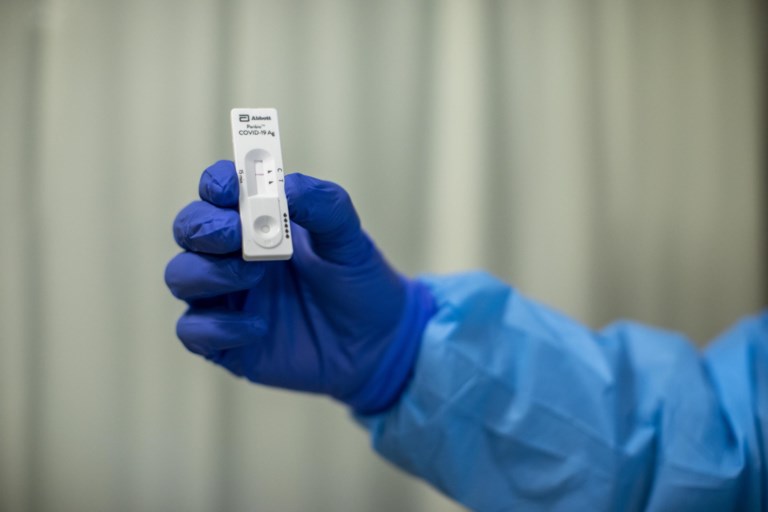From mid-April, coronavirus self-tests will become available in pharmacists in Belgium, but in Germany, people have already been able to buy them in most supermarkets over the past month.
In early March, when some German supermarket chains became the firsts to start selling the self-tests - in packs of five tests for €24.99 - they sold out in minutes, in part because many people from the Netherlands crossed the border to buy large numbers of them.
Just like in Belgium, approval for the use of self-tests to detect the coronavirus in the Netherlands only came last week, and just like in Belgium, they will only be available from mid-April.
When asked about this by the Dutch regional broadcaster Omroep Gelderland, a Dutchman said he went to buy them "to hand out to friends and neighbours, because everyone is dying for it. If I do a test like that, the children can come and visit."
According to the cabinet of Federal Health Minister Frank Vandenbroucke, Belgium will only make self-tests available through pharmacists, "who can clearly explain how they should be used".
The Decree issued by Vandenbroucke last week, also states that the pharmacist must inform the customer about the use of the self-test and must notify the person that, in the event of a positive result they should contact a doctor. Additionally, the tests should also only be available in pharmacies that are open to the public.
Related News
- Bpost launches rapid covid tests for staff
- Belgium confirms aim to develop self-tests before May
- Rapid Covid-19 tests can be sold in pharmacies in Belgium for self-testing
"It is not an entry ticket: even after a negative test, you still have to keep your distance from others," his cabinet told Het Nieuwsblad.
According to the Flemish Health and Care Agency, self-tests are not 100% reliable, which is why the goal of using them in Belgium's strategy is not to quickly test yourself before inviting a group of friends to your home or visiting your grandparents.
As they are not as reliable as PCR tests, it could be that someone tests negative but is still infected, and therefore still infectious to others, according to the chair of the testing taskforce Herman Goossens.
Even though it "is actually child's play," some people may still take the test incorrectly, he told VRT. "Some people have difficulty reading the result, because the line is sometimes not entirely clear. When in doubt, a PCR test should provide certainty."
Additionally, even if everyone is coronavirus-free, the tests do not show a lot of solidarity, as only people who can afford to buy a number of tests each time, can meet others safely - something the government wants to prevent.
"You cannot avoid it completely, but those who want to flout the measures will do so without a test too," Vandenbroucke's cabinet said. "It is an additional line of defence."
As Vandenbroucke said during a previous Consultative Committee, the government is working on these self-tests, and will start a communication campaign on their use, which are expected in early April (later this week).
In addition to clarifying the price, Belgium's campaign will also stress that self-tests are not a way to ignore the measures afterwards, just like the one launched by the German authorities, which clarifies what the tests can and cannot be used for.
"People who often come into contact with other people can easily check whether they have become infected," the explanation on the German coronavirus information website, infektionsschutz.de, states, adding that the tests are used in schools, with teachers and pupils getting a self-test once or twice a week.
Maïthé Chini
The Brussels Times

